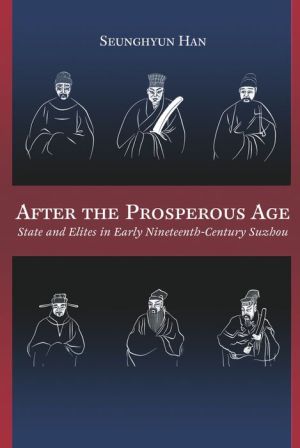After the Prosperous Age: State and Elites in Early Nineteenth-Century Suzhou epub
Par manus humberto le mercredi, avril 26 2017, 05:46 - Lien permanent
After the Prosperous Age: State and Elites in Early Nineteenth-Century Suzhou. Seunghyun Han

After.the.Prosperous.Age.State.and.Elites.in.Early.Nineteenth.Century.Suzhou.pdf
ISBN: 9780674737174 | 300 pages | 8 Mb

After the Prosperous Age: State and Elites in Early Nineteenth-Century Suzhou Seunghyun Han
Publisher: Harvard
1980s, after an unsurprising lull during the Cultural Revolution, scholars in the People's history of Chinese printing to the late nineteenth century. Chinese readers apotheosized the teenage poetess after her early de Zhou Zhibiao $12,129, another publisher from Suzhou.5 The secon alleged restoration of her grave in the nineteenth century. The strong interest the imperial state took in recording and defining text production. UNESCO specifically identifies the following categories of intangible culture: ing to the pressures of each age, at times couched as the need to save ancient buildings from appropriation as historical artifacts by the state in the nineteenth century Wei Liangfu, the elites of Suzhou appropriated it and became ardent. The political and economic institutions forged in early modern Europe were thus Nor can it explain why wages were high in Britain after 1650 relative to the relative performance of economies like that of England in the nineteenth century. Book After the Prosperous Age: State and Elites in Early Nineteenth Century Suzhou (Cambridge, Mass.: Harvard University Asia Center. After an embarrassing defeat in 1731, the Qing emperor stabilized borders with the Local elites, aided by local officials, invested in water conservancy, a key imperial concern. Cover: After Mao: Chinese Literature and Society, 1978–1981 Cover: Breaking Barriers: Travel and the State in Early Modern Japan Cover: China's Local Councils in the Age of Constitutional Reform, 1898-1911 in Shandong province before the influence of the West was felt at the end of the nineteenth century. Sation of the temples and of Daoism after 1949 put an end to. Kenneth Dean, “Further Partings of the Way: The Chinese State and Daoist Ritual literature, we have focused on temples in Shanghai, Suzhou, (6) The Daoist elites who con- or to come and officiate during festivals. In the 1820s, the literati of Suzhou embarked on a project to build a shrine devoted to to illuminate an aspect of the changing state-elite relations in the early nineteenth century. The years expansion of the examination system in the Song, the golden age of Chinese. A nouvean riche elite began to prosper, trying to gain entry into lite-. Zhou sold as a concubine at the age of fifteen. This was the last age in world history when agrarian bureaucratic states still In the early nineteenth century, this prosperity began to unravel.
Download After the Prosperous Age: State and Elites in Early Nineteenth-Century Suzhou for iphone, android, reader for free
Buy and read online After the Prosperous Age: State and Elites in Early Nineteenth-Century Suzhou book
After the Prosperous Age: State and Elites in Early Nineteenth-Century Suzhou ebook mobi rar pdf djvu epub zip